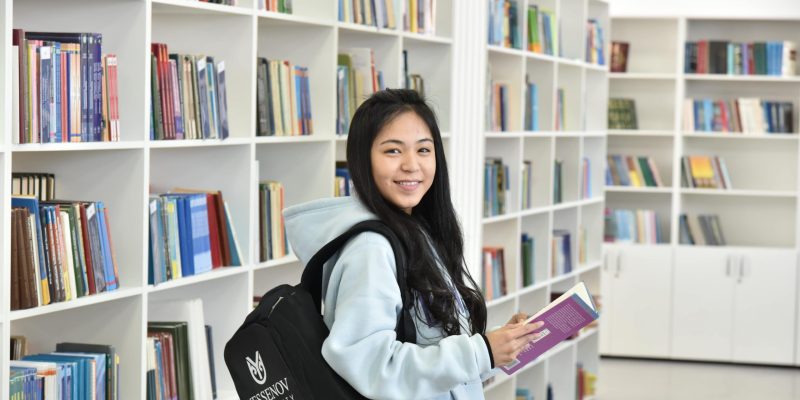Foreign language: two foreign languages
OL1
Selects language units and describes them in accordance with the speech parameters of the language levels.
– Identifies language facts from the perspective of language stories.
– Illustrates modern linguistic knowledge from the standpoint of the science of language.
– Interprets the norms of modern English
– Ranks tactics of speech behavior in terms of stylistic features and semantic-pragmatic orientation.
-Creates problematic situations to stimulate the needs of students in speech activity.
– Applies knowledge, understanding and ability to solve problems in new or unfamiliar situations in the contexts and within the wider (or interdisciplinary) areas related to the study area
-Uses skills to express his opinion competently, the ability to work in public, to work with scientific and official texts, mastering the necessary skills of oral and written speech.
OL2
– Demonstrates various approaches to modern
innovative and interactive teaching methods and applies them in practice.
– Reproduces the basics of oral and written communication,
-Improves communication skills, recognizes and uses reading, listening, writing and speaking skills.
– Explains the patterns of personality formation in the process of education and training, as well as the mechanisms of the process of assimilation of knowledge, development of abilities, taking into account its individual psychological characteristics.
-It classifies teaching technologies, methods and techniques based on the main achievements in the field of teaching foreign language education at school
– Applies acquired practical knowledge in the process of intercultural communication and in the process of directly pedagogical activity, developing students’ pronunciation skills;
– Apply knowledge of phonological phenomena and patterns of the studied language as a system; knowledge of the literary pronunciation of the studied language and the ability to apply this knowledge in communicative and professional activities;
– Has various types of discourse: oral and written, prepared and unprepared speech, official and unofficial speech; possession of phonological features of the main speech forms of utterance: narration, description, monologue, dialogue.
OL3
– Speaks fluently in three languages (Kazakh, Russian and English) in interpersonal, intercultural and professional communication,
– Uses the basic laws of mastering a foreign language and culture, developing the ability to communicate in a foreign language at interpersonal and intercultural levels,
– Structures the problems of learning a foreign language, choosing the optimal approaches and methods of teaching the language and culture;
– Demonstrates phonetically and intonationally correctly formed foreign language speech, taking into account the situation of communication;
– Interprets independently linguistic phenomena: compares and identifies similarities and differences in the corresponding subsystems of the compared languages to predict possible interference or transfer:
– Conducts independent research of linguistic phenomena of foreign and native languages,
– Solves methodological problems of learning a foreign language of one of the means of intercultural communication;
Applies the principles and methods of foreign language education in the context of intercultural communication;
– Uses new pedagogical technologies,
– Possesses skills in searching, evaluating, selecting and using pedagogical technologies, including information and multimedia teaching aids,
– Analyzes and synthesizes independently creatively transforms the information received to improve professional activities,
– Develops criteria and descriptors for assessing achievements of students in the process of teaching a foreign language;
OL4
-Possesses a lexical reserve necessary and sufficient for the implementation of productive and receptive foreign language activities;
– Applies the skills of perception and understanding of foreign texts when reading and listening;
– Practices to build holistic and logical statements in accordance with the conditions of foreign communication;
OL5
– Models abstracts of lessons of various types;
– Defines goals, objectives, stages, specific methods of action, focused on the development of key competencies of students;
– Interprets the results of the defense of a methodological portfolio based on the reflection of its methodological literacy.
– Uses the basic methods, techniques and means of obtaining, storing, processing information, ready to work with a computer as a means of information management;
– Reconstructs a foreign language at a level that allows you to receive and evaluate information in the field of professional activity from professional sources;
OL6
– Applies for linguistic and didactic purposes linguistic, culturological, literary and regional geographic information, giving a holistic view of the languages and culture being studied, the laws of their development and the relationship in social and historical contexts;
– Demonstrates organizational skills, leadership skills and active life position,
– Owns ethical and legal norms of behavior.
– Demonstrates developing knowledge and understanding obtained at the level of higher education, which are the basis or opportunity for the original development or application of ideas, often in the context of scientific research.
OL7
– Possesses a foreign language in accordance with the requirements of the international standard, a foreign language for academic (professional) and for special purposes:
– Uses a foreign language as a means of intercultural communication:
– Understands authentic texts:
– Uses various reading strategies:
– Represents various forms of detailed written statements:
– Uses scientific and reference literature, dictionaries of various types.
OL8
Used in various ways and forms of communication of speech activity;
– Uses language means to implement communicative intent in accordance with the spheres and situations of communication, taking into account the components that make up the situation: understanding the statement in meaningful semantic blocks:
– Plans his speech behavior and conveys information in coherent, logically reasoned statements;
– Represents his speech and non-speech behavior in accordance with the linguoculturological and sociocultural specifics of the country of the studied language
-Makes self-education and self-improvement in knowledge of foreign languages
– Communicates its findings and knowledge and their justification to specialists and non-specialists;
– Continues training on his own.
